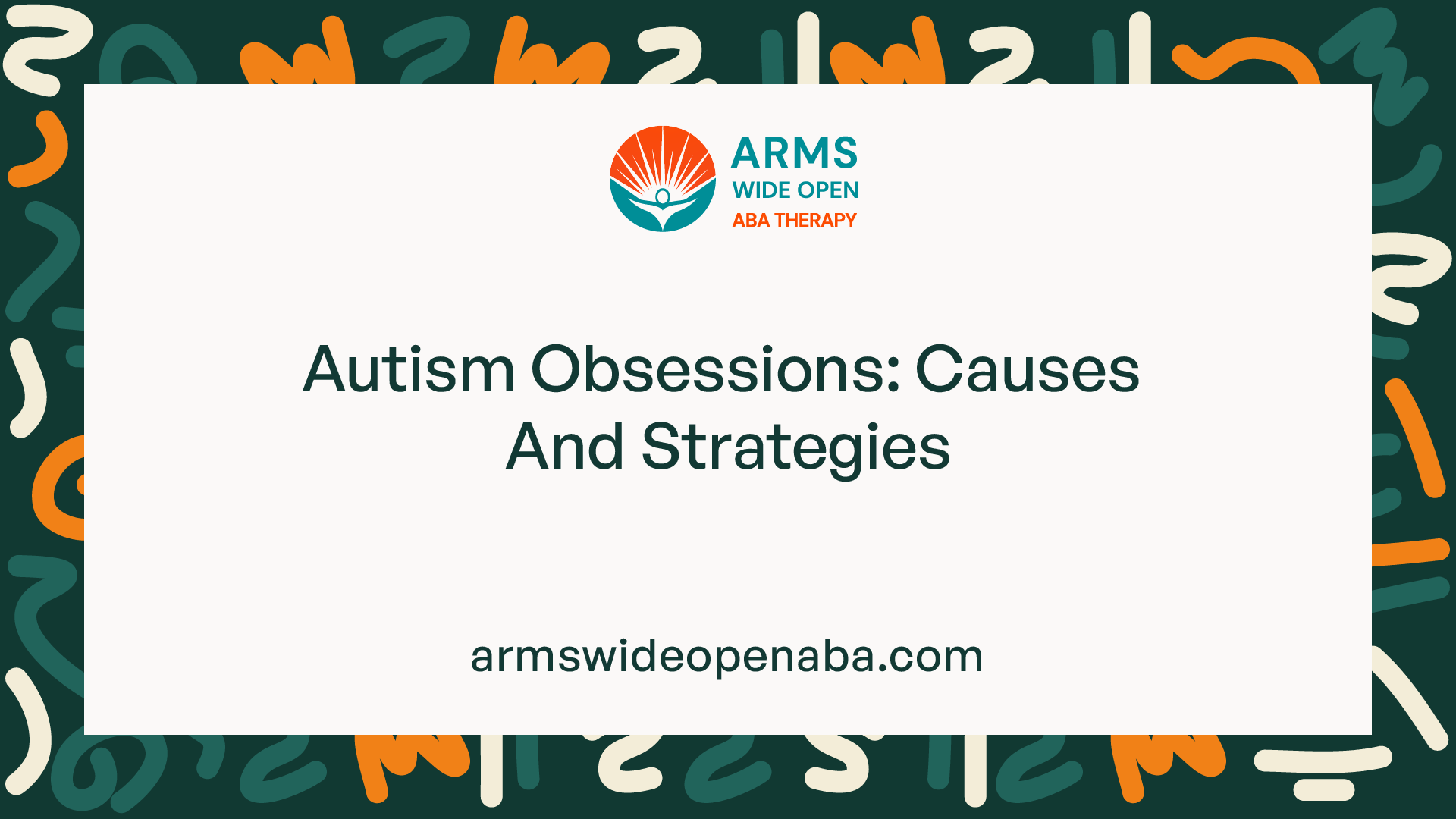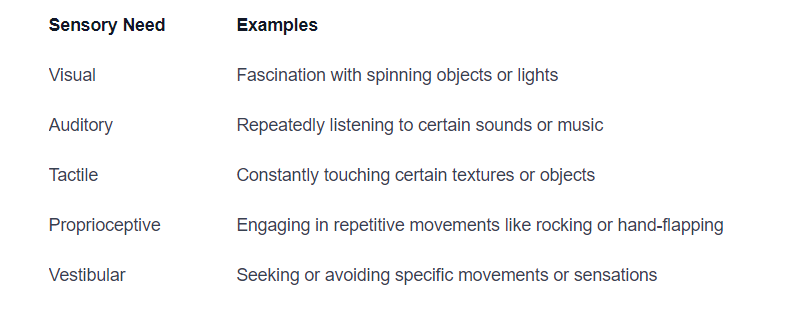Autism Obsessions: Causes And Strategies
Unraveling autism obsessions: Discover the causes and effective strategies to support individuals on their unique journey.

Understanding Autism Obsessions
Autism obsessions are a common characteristic of individuals on the autism spectrum. These obsessions refer to intense interests or preoccupations that can capture a person's attention for extended periods. Understanding the nature of these obsessions and their role in autism is crucial for providing appropriate support and accommodations.

What Are Autism Obsessions?
Autism obsessions, also known as special interests, are highly focused areas of interest that captivate individuals with autism. These interests can vary widely, ranging from specific topics or activities to objects or patterns. What distinguishes autism obsessions from typical hobbies or interests is the intensity and duration of the preoccupation.
Individuals with autism may display an intense desire to learn about, engage with, and talk about their special interests. These obsessions often bring them joy, comfort, and a sense of purpose. It's important to note that autism obsessions are not inherently negative or problematic; they are simply a unique aspect of neurodiversity.
The Role of Obsessions in Autism
Autism obsessions play a significant role in the lives of individuals on the autism spectrum. These obsessions can serve as a source of motivation, self-expression, and identity. They can provide comfort and stability in a world that may feel overwhelming due to sensory sensitivities and social challenges.
Moreover, autism obsessions can also serve as a mechanism for coping with anxiety or stress. Engaging with their special interests allows individuals with autism to find solace, regulate their emotions, and create a sense of predictability in their lives. The intense focus and hyperattention associated with obsessions can provide a welcome escape from the demands of everyday life.
Understanding the positive aspects of autism obsessions is crucial for supporting individuals on the autism spectrum. By embracing and accommodating these special interests, we can create an environment that fosters their growth and well-being. It's important to strike a balance between encouraging the pursuit of special interests and ensuring that individuals with autism also develop other necessary skills, such as communication, socialization, and emotional regulation.
By recognizing and appreciating the role of autism obsessions, we can better understand and support individuals on the autism spectrum. It is essential to provide a safe and inclusive space where their interests can thrive, while also equipping them with the necessary tools and strategies to navigate the challenges they may encounter.
Causes of Autism Obsessions
Understanding the underlying causes of autism obsessions can provide valuable insights into how to effectively manage and support individuals on the autism spectrum. Several factors contribute to the development of these obsessions, including sensory needs and stimulation, special interests and hyperfocus, and anxiety and coping mechanisms.
Sensory Needs and Stimulation
Many individuals with autism have unique sensory needs and sensitivities. They may seek or avoid certain sensory experiences, leading to the development of obsessions. Engaging in repetitive behaviors or fixating on specific objects or topics can provide a sense of comfort and control in a world that may feel overwhelming.
To better understand the sensory needs associated with autism, consider the following table:

Special Interests and Hyperfocus
Another common cause of autism obsessions is the presence of special interests and hyperfocus. Many individuals on the autism spectrum develop intense passions for particular topics, objects, or activities. They may spend hours researching, collecting, or engaging in their special interests with unwavering focus and enthusiasm.
Special interests and hyperfocus can provide individuals with autism a sense of purpose, satisfaction, and expertise. These obsessions can also serve as a vehicle for learning and skill development. It's important to recognize and support these interests, as they can play a significant role in the individual's overall well-being and personal growth.
Anxiety and Coping Mechanisms
Anxiety is a common experience for individuals on the autism spectrum. The uncertainty and unpredictability of daily life can be challenging for them, leading to heightened anxiety levels. In response, individuals may develop obsessions as a way to cope with and manage their anxiety. These obsessions can serve as a source of comfort and stability in an otherwise chaotic world.
By engaging in repetitive behaviors or focusing intensely on specific interests, individuals with autism may find relief from their anxiety. However, it's important to strike a balance between allowing these coping mechanisms and ensuring that they do not hinder daily functioning or social interactions.
Understanding the causes behind autism obsessions is crucial for providing appropriate support and intervention strategies. By recognizing and addressing sensory needs, embracing special interests, and helping individuals develop healthy coping mechanisms, we can create a supportive environment that promotes their overall well-being and success.
Strategies for Managing Autism Obsessions
When it comes to managing autism obsessions, there are various strategies that can be implemented to provide support and promote overall well-being. These strategies aim to help individuals with autism embrace their special interests while maintaining a balanced and fulfilling life. Here are three effective strategies for managing autism obsessions:
Embrace and Support Special Interests
One of the key strategies for managing autism obsessions is to embrace and support the individual's special interests. Special interests can provide a sense of joy, fulfillment, and purpose for individuals with autism. By encouraging and engaging in these interests, it helps to foster a positive and supportive environment.
Supporting special interests can include providing opportunities for further exploration and learning. This can involve providing books, resources, or access to relevant activities or communities. Additionally, incorporating special interests into daily routines and activities can help individuals feel more connected and engaged.
Establishing Routines and Predictability
Establishing routines and predictability is another essential strategy in managing autism obsessions. Routines provide a sense of structure and stability, which can be especially beneficial for individuals with autism who thrive on predictability. Having consistent schedules and clear expectations can help reduce anxiety and provide a sense of control.
To establish routines, it's important to create visual schedules or use visual supports such as calendars or timers. These visual aids can help individuals understand and anticipate transitions between activities, reducing stress and facilitating a smoother transition.
Providing Alternative Outlets for Stimulation
Autism obsessions can sometimes involve intense sensory stimulation. Providing alternative outlets for stimulation can help individuals redirect their focus and manage their obsessions in a healthy way. These outlets can include engaging in physical activities, creative pursuits, or sensory-based activities.
Engaging in physical activities like exercise or sports can help individuals release excess energy and promote overall well-being. Creative pursuits such as drawing, painting, or playing a musical instrument can provide a creative outlet for self-expression. Sensory-based activities like using sensory toys or engaging in sensory play can help individuals find alternative sources of sensory stimulation.
By implementing these strategies, individuals with autism can find a balance between their obsessions and other aspects of their lives. It's important to remember that each individual is unique, and strategies should be tailored to their specific needs and preferences. Working closely with professionals and seeking support from autism-specific resources can further enhance the effectiveness of these strategies.
Supporting Individuals with Autism Obsessions
When it comes to individuals with autism who experience obsessions, there are various strategies and approaches that can help provide support and understanding. By focusing on communication and social skills, teaching coping mechanisms and emotional regulation, and seeking professional support and resources, we can create a nurturing environment for individuals with autism.
Encouraging Communication and Social Skills
One essential aspect of supporting individuals with autism obsessions is promoting effective communication and social skills. Encouraging open dialogue and active listening can help build trust and understanding between individuals with autism and their peers or caregivers. Some strategies to facilitate communication and social skills development include:
- Using visual aids, such as social stories or visual schedules, to help individuals with autism understand social situations and expectations.
- Providing opportunities for social interactions, such as group activities or structured playdates, that encourage individuals with autism to practice their social skills in a supportive environment.
- Utilizing assistive communication devices, like augmentative and alternative communication (AAC) systems, to facilitate communication for non-verbal individuals with autism.
Teaching Coping Mechanisms and Emotional Regulation
Another important aspect of supporting individuals with autism obsessions is teaching coping mechanisms and emotional regulation techniques. These strategies can help individuals manage their emotions and navigate challenging situations. Some effective approaches to teaching coping mechanisms and emotional regulation include:
- Implementing visual supports, such as emotion charts or calming cue cards, to help individuals with autism identify and express their emotions.
- Teaching relaxation techniques, such as deep breathing exercises or sensory-based activities, to help individuals with autism reduce anxiety and regulate their emotions.
- Developing personalized coping strategies, in collaboration with individuals with autism and their caregivers, to address specific triggers or challenges related to their obsessions.
Seeking Professional Support and Resources
In addition to implementing strategies within the immediate support network, seeking professional support and accessing available resources can greatly benefit individuals with autism obsessions. Professionals with expertise in autism can provide guidance, specialized interventions, and additional resources. Some avenues to consider include:
- Consulting with autism specialists, such as psychologists, therapists, or behavior analysts, who can offer tailored interventions and strategies to address obsessions and related challenges.
- Participating in support groups or workshops specifically designed for individuals with autism and their families, where they can share experiences and learn from others who may have similar challenges.
- Exploring community resources, such as local autism organizations or online platforms, that provide information, educational materials, and support networks for individuals with autism and their caregivers.
By encouraging communication and social skills, teaching coping mechanisms and emotional regulation, and seeking professional support and resources, we can create an inclusive and supportive environment for individuals with autism obsessions. It's important to remember that each individual is unique, so personalized approaches should be considered when providing support.
Sources
https://www.goldstarrehab.com/parent-resources/autism-obsessions
https://www.autism.org.uk/advice-and-guidance/topics/behaviour/obsessions/all-audiences
https://www.crossrivertherapy.com/autism/obsessions
Similar articles
We’re here to help you

Our team is here to assist you in this process. Contact us for any assistance.
it’s easy to apply
We Accept Most Insurances
Our in-network insurance partnerships make ABA therapy more accessible to families throughout our service areas.







Our Insurance Process
We'll request your insurance details to help us verify your plan's coverage for ABA therapy. Once we've received this information, we'll walk you through your benefits, including copayments, deductibles and out-of-pocket maximums, so you know what to expect in advance.
Our team will then handle the preauthorization and all the necessary paperwork.
.svg)





















.jpeg)


































.jpeg)




.jpeg)







.jpeg)











.jpeg)
















